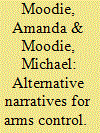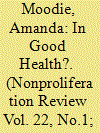| Srl | Item |
| 1 |
ID:
096501


|
|
|
|
|
| Publication |
2010.
|
| Summary/Abstract |
The efforts of President Barack Obama and his administration to restore the United States as a driving force of multilateral arms control and nonproliferation negotiations are commendable, yet the lack of progress on such issues over the last eight years has ensured that U.S. policy has not kept pace with changes in the geostrategic environment and the evolving security agenda. Meanwhile, an alternative agenda has been articulated by non-Western countries. This article focuses on the arms control perspectives of Non-Aligned Movement states and others that have begun to embrace the idea of "disarmament as humanitarian action." It explores this idea in the context of recent initiatives and argues that if the Obama administration wants to make progress on its arms control and nonproliferation priorities, it should consider a multifaceted approach that incorporates this emerging alternative agenda.
|
|
|
|
|
|
|
|
|
|
|
|
|
|
|
|
| 2 |
ID:
142652


|
|
|
|
|
| Summary/Abstract |
Since the 1990s, the group of stakeholders working to combat biological weapons (BW) proliferation has broadened to include new actors who have not traditionally focused on security issues, including organizations from the public health sector, researchers in the life sciences, and the biosafety community. This has had significant benefits for the Biological and Toxin Weapons Convention (BWC) and the arms control establishment more broadly. However, the BWC's agenda has become increasingly dominated by issues of international health and global health security. By focusing solely on response strategies, the United States and other interested parties risk losing sight of other important elements of a counter-BW strategy, including deterrence and prevention. Focusing on public health-related issues to the exclusion of more traditional security matters puts the nonproliferation regime at risk, because it limits the amount of time that stakeholders have available to grapple with the critical questions facing the BWC and the biological weapons nonproliferation establishment—questions that must be answered if the regime is to survive.
|
|
|
|
|
|
|
|
|
|
|
|
|
|
|
|